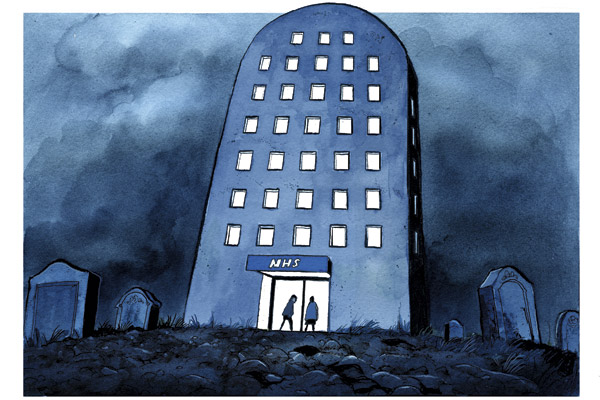Should heads roll over the Mid Staffordshire Hospitals Trust scandal? I ask only because as I listened to Mark Carney giving evidence to the Treasury Select Committee for several hours this morning, I found myself browsing through a number of articles on this site and others about the Libor scandal. Back in those heady days of George Osborne accusing Ed Balls of having questions to answer, and Bob Diamond resigning from Barclays ahead of his appearance before the same select committee, people were very keen for heads to roll, and not just those sitting on bankers’ necks. They were also keen that those who performed badly when questioned about their suspicions of Libor fixing didn’t rise to higher positions, with Paul Tucker watching his own shot at the job Carney has now won slipping away.
Quite unsurprisingly in the circumstances, the relatives whose campaigning brought matters to a head do want Sir David Nicholson to resign as NHS chief executive. But David Cameron himself was very careful to echo the Francis Report’s insistence that the response to the scandal shouldn’t involve seeking out scapegoats. When journalists asked the Downing Street spokeswoman about it this afternoon, she repeated the PM’s scapegoats line, adding that since the Mid-Staffs scandal, a number of changes have already been carried out. And as Dan Hodges points out in his Telegraph blog, those on the left who usually expend considerable effort attacking the government on health matters were just a little quiet yesterday when the Francis report was published. There has been a noticeable reluctance to apportion individual blame in these circumstances when other scandals have led not just to a great deal of soul-searching about how the system worked, but about its protagonists, too. No doctors or nurses have been struck off, although Cameron was more robust on this yesterday, arguing that the regulators involved needed to answer questions about why healthcare professionals were not held accountable. Will heads roll at the regulators, too?
Now, obviously in many cases it’s easy for witch hunts that force a resignation to start, particularly when 24 hour news and social media means that everything moves at double-speed. But whether or not heads should roll at the top, there’s an important lesson from this which is that the NHS remains so sacrosanct even after yesterday’s revelations that parts, including its staff, remain untouchable. As well as avoiding blaming anyone, including those members of the last Labour government opposite him in the Chamber as he delivered the statement, David Cameron made sure he started his statement with that familiar ‘I love the NHS’ caveat.
This problem goes beyond whether people should or shouldn’t be sacked, because it’s even more important that things change to stop another Stafford Hospital situation occurring in the future. It shows quite how nervous politicians are about appearing to go too far on the NHS. And that is a big problem because, as Ross Clark explores in his cover feature for this week’s Spectator, there needs to be a solution beyond ‘lessons learned’ for those failing hospitals like Stafford. That could well involve allowing private-sector providers to take over the running of hospitals, a suggestion which immediately provokes that accusation of going too far from trade unions and commentators alike. If politicians are going to continue to be squeamish about blaming NHS employees – whether at the top of the service or those changing the bed sheets – they’ll be squeamish about suggesting that anything other than a state-owned monolith might be a sensible way of running the free at the point of delivery health service that the British public feels so emotional about. And as anyone who works in the health service knows, squeamishness is not a helpful character trait at all.







Comments